Brutal waves in Newport Bermuda Race
Published on June 19th, 2022
Hamilton, Bermuda (June 19, 2022) – Jason Carroll (New York City) stood on the dock at Royal Bermuda Yacht Club well after midnight, looking fatigued yet energized after winning line honors in the 52nd Newport Bermuda Race.
Carroll and his crew on the MOD70 trimaran Argo set an elapsed-time record time of 33 hours—faster than any elapsed time ever recorded in the 116-year history of the Bermuda Race—covering the 635-nautical mile course at an average speed of 19.24 knots. But it wasn’t without some pain.
“The forecast under-appreciated just how rough the sea state was,” said the 44-year-old Carroll. Later he added, “The whole crew is wiped out. We’re tired.”
Tired, perhaps, but also happy to set another course record—Argo’s sixth, to go with two world records—and relieved that they made it to shore in one piece. They were the first Saturday-night finishers in the history of the storied race, co-organized by the Cruising Club of America and the Royal Bermuda Yacht Club.
“We’re thrilled about the record,” said Chad Corning (New Rochelle, New York), the program’s manager. “There are only so many major ocean races…to have the Bermuda Race, the Middle Sea Race and the Caribbean 600 means a lot to us. And it’s great to be the only boat to finish on Saturday. The Bermuda Race has so much history, this record is probably the most significant one for us because it is such a well-established race. It’s a great feeling.”
Carroll’s international crew aboard Argo included Westy Barlow (Newport, Rhode Island), Corning, Pete Cumming (Warsash, England), Thierry Fouchier (Marseille, France), boat captain Chris Maxted (Melbourne, Australia), Charlie Ogletree (Seabrook, Texas) and Alister Richardson (Bournemouth, England).
Balrow replaced navigator/sailing master Brian Thompson (Cowes, England) who tested positive for COVID before the race and did not sail. Corning filled in as navigator.
“On paper it was very much a rhumbline race,” said Corning. “We ended up to west of rhumb because we had to sail high to keep the boat under control. If we bore away, we’d have sped up too much. We were trying to keep the speed around 20 knots. So, we were keeping a higher course to keep the boat slow, that’s why we weren’t on rhumbline.”
After starting the race with a full main and J1 headsail, clearing the committee boat within mere feet, Carroll said that it didn’t take long for the crew to start depowering.
“We spent a lot of time throttled back, making sure we wouldn’t have a problem. It was quite rough for us in the middle of the race,” Carroll said. “About three hours into the race, we were down to two reefs and the J2. Ten hours in we had the J3. We made a whole bunch of steps down in first few hours as we got offshore.”
Corning echoed Carroll in saying that it was a rough race, mostly due to the sea state.
“We were expecting a sea state of 2 to 2.5 meters, but in general it was 3.5 to 4 meters,” said Corning. “The Gulf Stream was a bit smoother because the current direction was more or less aligned with the wind direction. We had 25-30 knots of wind for most of the race, and the high was mid-30s at times. We were really just hanging on.”
Corning said that they transited the Gulf Stream at about 90 degrees and saw a 4-knot current flowing west to east, but they were in and out of it quickly. They sailed the meat of the course with two reefs and a storm jib for about 21 hours, from Friday evening until Saturday afternoon (June 17-18).
“It was some of roughest conditions we’ve had on the boat,” Corning said. “The sea state was just nasty, coming from all different directions. You never knew where the waves were coming from and they would hit the boat at all different angles. You had to crawl around the cockpit to get anywhere. It was a very violent motion, a lot of the guys got sick.”
Mālama Second to Finish
At 07:48:43 ADT this morning, almost eight and a half hours after Argo finished, skipper Charlie Enright (Barrington, Rhode Island) guided the IMOCA 60 Mālama from 11th Hour Racing across the finish line. Mālama, like Argo a foil-assisted craft, completed the course in 41h:28m:48s, at an average speed of 15.3 knots.
While Argo’s elapsed time is the fastest in the history of the race, Mālama’s is the fourth fastest. The two foilers bookend the 100-foot Comanche’s 34h:49m mark in 2016 and the 90-foot Rambler 90’s 39h:39m time in 2012.
Enright said that Mālama experienced winds up to 35 knots and never sailed lower than 70 degrees to the wind. “It was pretty impressive,” he said, “sailing with cracked sheets upwind doing 18 knots.
Enright noted how the team had to overcome issues that cropped up with electronics and rigging, with the focus otherwise on safety. “In those conditions we try not to come out of the water [on the foils]; we’re trying to displace as much of the boat as possible. We can control how much we come out by adjusting the rake of the foil and the extension of the foil.”
Gibbs Hill, St. David’s Leaders Approach Island
With the foilers safely moored in Bermuda, the focus is now on to be the elapsed-time winner of the race’s major divisions. At 1300 ADT today, there is a battle royale taking place.
The leading boats in the Gibbs Hill Lighthouse Division included Christopher Sheehan’s Pac52 Warrior Won, the Mills 68 Prospector, owned by Lawrence Landry, Paul McDowell, and Martin Roesch, and the TP52 Hooligan owned by John Evans and John Sheehan.
In the St. David’s Lighthouse Division, Kate and Jim Murray’s Pac52 Callisto from the U.K. is leading the Reichel/Pugh 74 Wizard, chartered by Fred Detwiler and Bruce Aikens.
All of those boats are racing within proximity of each other to the west of rhumbline. The forecast is predicting lighter winds throughout the afternoon, so the first finisher likely won’t cross the line until early tomorrow morning.
Casualty on the course
The crew of the yacht Morgan of Marietta, a Centurion 42, reported that owner/skipper Colin Golder (New Providence, NJ) went overboard early this afternoon in strong winds, approximately 325 miles from Bermuda, and did not survive. After extended effort, Golder’s body was recovered by the vessel’s crew, and the vessel is returning to the mainland. Next of kin has been informed.
Event information – Race details – Entry list – Tracker
The 52nd running of the Newport Bermuda Race, co-organized by the Cruising Club of America (CCA) and the Royal Bermuda Yacht Club (RBYC), began Friday, June 17, 2022 at the entrance to the East Passage of Rhode Island’s Narragansett Bay.
First run in 1906, the Bermuda Race is the oldest of the five great 600-nautical mile races and is preceded only by the Transatlantic Race. The 2022 fleet has 187 entrants which will be split among eight divisions: Double-handed, Finisterre (for cruisers), Gibbs Hill Lighthouse, Multihull, Open, Spirit of Tradition, St. David’s Lighthouse and Superyacht.
The record within the major divisions—St. David’s Lighthouse (limits on pro crew) and Gibbs Hill Lighthouse (no limits)—is 39 hours and 39 minutes, set by George David’s maxi yacht Rambler 90 in 2012, an average speed of 16 knots.
Source: CCA


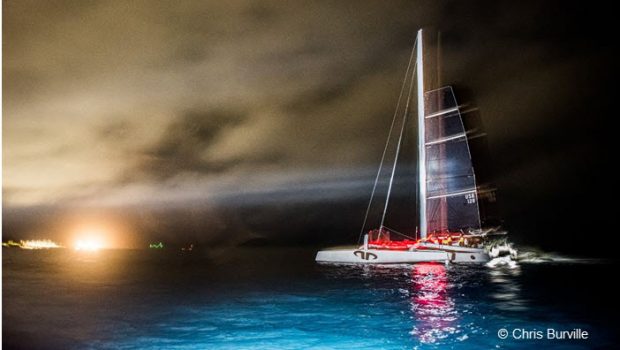


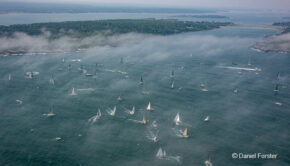
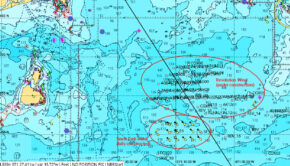
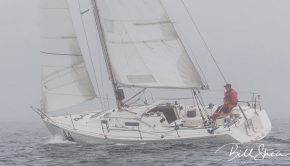
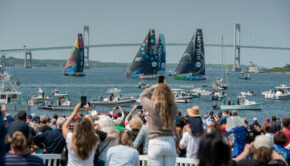
 We’ll keep your information safe.
We’ll keep your information safe.